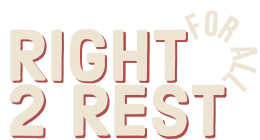Frequently Asked Questions
-
The Right to Rest Act is a measure designed to allow people to exist and rest in public space without being discriminately criminalized.
Homeless people are most often prosecuted for "crimes of survival," like sitting, lying down, or sleeping in public space. In order to protect them from discriminatory enforcement of laws that prevent rest, the Right to Rest Act would:
Extend the privacy rights afforded to homeowners to homeless people, preventing the unlawful seizure and destruction of their possessions based on housing status.
Prohibit law enforcement, security personnel, or public employees from harassing, citing, or arresting homeless people for exercising the right to exist in public space.
Create an exception for public spaces that are closed, as long as adequate alternate spaces are provided for people to rest without time limitations.
Provide a defense to civil and criminal charges when the basis for those charges is that the person was merely engaging in the protected activities listed above.
Allow the Bureau of Labor and Industries (BOLI) to enforce the protections of this bill in the same manner they use to enforce the protections of other non-discrimination laws and will allow private attorneys to advocate for homeless people in addition to BOLI’s enforcement.
-
People will be able to perform these activities in public space:
Use and move freely
Rest (sit, stand, and sleep etc.)
Eat and share food
Pray
Occupy a legally parked vehicle
This bill does not protect obstruction sidewalks and businesses, defecation, or harassment in public spaces.
-
Rep. Farrah Chaichi and Rep. Khanh Pham, fierce advocates for human rights. Learn more about them on our blog.
-
The bill was killed after a convoluted and inequitable legislative process. This year, we’re asking for a fair hearing to ensure community voices are heard.
-
The fundamental difference between HB3115 passed in 2021 and the Right to Rest Act is the use of the term “objectively reasonable.” There is no common definition for objectively reasonable, which therefore leaves the interpretation up to each individual municipality - very similar to our current circumstances. The Right to Rest Act specifically details protected activities (those listed above) in the bill as well as the provision to allocate resources that went to policing those activities towards direct housing solutions.
In addition to vague language regarding protected activities, this bill puts the onus on unhoused persons to litigate for their own rights. Lawsuits and appeals are arduous, costly, and highly inaccessible. This bill, in the guise of protecting legal actions, made it even more difficult to change laws that directly impact unhoused people.
Read the bill language for HB3115 here.
-
Rest is essential to everyone’s health, well-being, and ability to function. Laws criminalizing rest not only exacerbate and cause physical and mental health issues, they are a human and civil rights violation. Decriminalizing rest must be our first step toward truly supporting our neighbors without housing.
